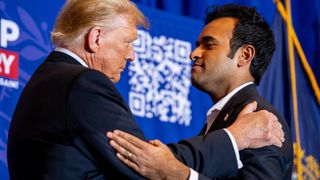Franklin Delano Roosevelt’s first vice-president, John Nance Garner, famously described the vice-presidency as “not worth a bucket of warm spit.” In fact, some vice-presidents have been highly consequential to American politics and policy.
Bill Clinton chose fellow southern centrist Al Gore in 1992 knowing it would send a powerful signal of generational change to the country. It worked and Clinton handed significant policy areas, such as climate change and Russia relations, over to Gore. When George W. Bush ran against Gore in 2000, he asked Dick Cheney to lead the search for a VP and Cheney chose himself, later asserting a major influence on national security policy in the aftermath of the 9/11 terrorist attacks.
In this election cycle the vice-presidency could be more important than ever. The obvious reason is the advanced age of the two candidates. Actuary tables suggest the next vice-president is more likely to assume the role of president than with any prior election in US history.
The fact that either winner would be limited to one term puts the VP on a fast track to seeking the presidency even if the holder of the top job stays healthy. The other reason to watch the number two slot is that Donald Trump’s choice will be a key indicator of how chaotic a second Trump term might be.
Trump the showman will ensure a score of potential VPs parade before him on stage like contestants on his TV reality show, The Apprentice. Some of these contenders are essentially “mini-me” versions of Trump himself. Tech entrepreneur Vivek Ramaswamy and former TV news presenter Kari Lake both thrive on the shock-jock populism and conspiracy theories that appeal to many of Trump’s core MAGA supporters, and both are interviewing aggressively for the job on shows they think Trump will watch. Others echo Trump’s more isolationist and protectionist instincts, such as Ohio senator JD Vance and former Democratic Hawaii congresswoman Tulsi Gabbard, who have both shocked allies by threatening NATO and peddling a softer line on Putin.
My guess is that Trump will flirt with — but ultimately not choose — from this list of disrupters. For one thing, while he adores the flattery, he has never been interested in sharing the stage with lesser versions of himself. He much prefers low-key figures behind him who look like they came from central casting. And more importantly, he will have a hard time winning in November if he can’t bring home the 20-30 per cent of moderate Republican primary voters who went for Nikki Haley even after she had dropped out of the race.
Attacking Joe Biden won’t be enough to get these anti-Trump voters back — Trump will also need to provide validation to those moderates that he is an acceptable choice. A bomb-throwing populist won’t do that.
Who would? The answer is Republicans who are reassuring to the establishment but also demonstrably loyal to Trump — or at least who have never crossed him. At the top of the list would be South Carolina senator Tim Scott, who ran against Trump in the primary but then endorsed him. Trump has surprised the Biden camp with higher-than-expected levels of support in the black and Hispanic communities, and Scott would keep that momentum up as the most prominent black Republican in congress — and, importantly, an internationalist who has advanced AUKUS in the Senate Foreign Relations Committee.
Less well-known but attractive to Trump is Florida congressman Byron Donalds, who caught national attention with conservatives when the Congressional Black Caucus barred him from membership. Donalds has one foot in the disrupter camp having said he would not have certified Biden’s election in 2020, but he has supported aid for Israel and appears more internationalist than the pure disrupters.
Many political experts think Trump would do well to choose a woman since Republicans have fared poorly with female voters since the Supreme Court overturned Roe v Wade and a woman’s right to choose in 2022. Though most Republican VP candidates would be pro-life and not likely to woo pro-choice voters, a woman on the ticket could still help to shift enough votes from women in swing states to make a difference in November.
One compelling candidate would be Iowa senator Joni Ernst, a military veteran and thoughtful member of the Senate Armed Services Committee, although she has crossed swords with the anti-Ukraine isolationists around Trump (like his son, Don Jr). Trump could also choose Arkansas Governor Sarah Huckabee Sanders, who served as a surprisingly effective press spokeswoman for him while he was president.
As Governor, Huckabee-Sanders has travelled to Asia and spoken of the importance of US regional allies while sounding the alarm about China.
New York Representative Elise Stefanik has a shot at the job as well. She worked in the Bush White House and surprised her former colleagues by veering into the MAGA world, but her background and her congressional district do anchor her at least partially in the pragmatic wing of the Republican Party.
Two other women on Trump’s short list who may be sliding off it are South Dakota Governor Kristi Noem, who shone brightly in Trump world until she became the butt of jokes for doing ill-advised advertisements for her dentist, and Alabama senator Katie Britt, who became an even bigger target of late-night comedy for her disastrously mockable rebuttal to Biden’s State of the Union Speech (just google “Katie Britt Saturday Night Live” for a chuckle).
Because Trump is so little interested in governing or day-to-day policymaking, any VP from the list of pragmatists would have an outsized influence in recruiting key cabinet members and blocking and tackling against some of Trump’s worst impulses.
If Trump chooses a VP from the list provocateurs, on the other hand, then we can expect chaos added to chaos (topped with a dollop of chaos). But if he goes with a provocateur, we can also expect his chances of winning to decrease.
And Biden’s vice-president? There was earlier speculation that Biden would drop Kamala Harris in favour of someone more popular nationally, but don’t count on it. Biden has vulnerabilities with young Democratic voters who see Harris as more of a genuine progressive.
And with Trump nibbling at the black vote it is inconceivable that Biden would drop the country’s first vice-president of colour. Harris has carried Biden’s water on issues such as immigration and abortion, with less of a profile on foreign policy.
However, all indications are that she is fully on board with the administration’s allies-first Asia strategy even if she may be something of a drag on trade policy because of her adherence to a workers-first agenda. If Biden wins re-election, Harris can be expected to assert herself in anticipation of her own run in 2028. And since her worry will be challengers from the left of the party in the Democratic primaries, she may try to pull a second-term Biden administration in that direction.
It’s Trump versus Biden, but for all these reasons the vice-presidency could be a lot more important than just a bucket of warm spit.






